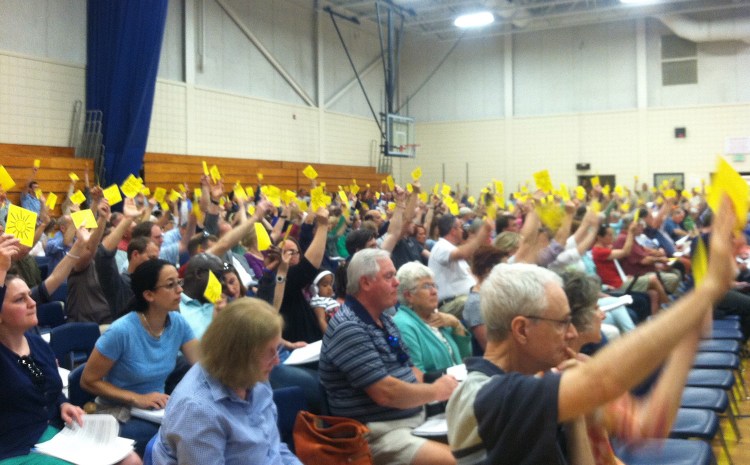YARMOUTH — An overwhelming majority of the more than 500 residents who packed the gymnasium Tuesday night at Harrison Middle School supported a $36 million municipal spending plan, including a $23.1 million school budget that had generated backlash among voters concerned about the district’s spending.
Staff from the town clerk’s office provided the crowd estimate and said the town meeting turnout was the largest in more than a decade.
Residents, voting from the floor with a hand-count, overwhelmingly supported the school budget, with fewer than 30 raising their hands in opposition to budget warrant articles. Voters also approved article 16, authorizing the district to raise and spend $4.9 million in additional local funds, exceeding the state’s mandated school funding by $4.6 million. The secret-ballot vote was 363 to 73.
Voters also adopted an $11.9 million municipal spending plan Tuesday night. A second vote on adopting the school budget is set for next Tuesday.
BUDGET PROCESS INVOLVEMENT
This year’s school budget generated rival camps for and against the spending plan. The Yarmouth Study Committee agitated against the budget and criticized what it called runaway spending by the district, which serves 1,514 students. In a flier sent to residents days before the town meeting, the Study Committee urged voters to reject article 16 specifically.
Another campaign, Yes for Yarmouth, organized in favor of the budget.
Camilla Shannon, from Yes for Yarmouth, said the massive turnout demonstrated the town’s support for education.
“I think the process has re-engaged a lot of people,” Shannon said. “I would say Yarmouth draws education-minded families and community-minded families. When given the opportunity to express their support for education, they do.”
Residents at the town meeting can motion to reduce budget figures from the floor, but no amendments were suggested Tuesday. The only discussion occurred for article 16, when a handful of residents stood to question the district’s spending policies.
Brian Bicknell asked about students from outside the district who attend district schools, including children of Yarmouth teachers who live outside the district.
In response, Superintendent Andrew Dolloff said about 65 students from outside Yarmouth attend its schools. He said about a third of the students come from Chebeague Island under a contract, a third pay private tuition and a third are the children of teachers. Those students are not accepted if it would increase the costs to the district, such as forcing it to hire new teachers, Dolloff said.
Resident Ronald Terry said school funding was too complicated for average residents to understand and that many, including those on a fixed income, had no alternative other than to keep paying increased taxes each year.
STUDENT POPULATION GROWING FAST
The proposed school budget is up about $1 million, or 5 percent, from last year. School officials have said the spending is driven by unprecedented growth in the student population. It includes hiring new full-time teachers for the third and eighth grades, a full-time nurse and eight part-time staff members. Staff pay and benefit increases and $80,000 for new technology also are in the budget.
Although spending is rising, it is balanced by more state eduction funding, meaning the school budget would only increase local taxes 1.6 percent next year, according to school committee figures. When combined with the town budget, the tax rate would decline slightly next year, making 2017 the third year in a row that Yarmouth property taxes would decrease.
The Yarmouth district has a reputation for providing an excellent education and its schools regularly top the best-in-Maine list. Support for education spending is strong and some voters have advocated for increased spending.
But opponents say runaway education spending has come at the expense of municipal services, and that high taxes are driving residents with fixed incomes out of town.
Discontent over the budget has emerged before, but this year budget opponents were more vocal and organized than in years past. They invested in campaign ads and literature aimed at getting residents to town meeting and the June 14 polls to vote down the budget.
Send questions/comments to the editors.



Comments are no longer available on this story